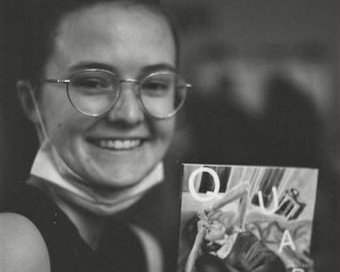“. . . what do such large, loose, baggy monsters, with their queer elements of the accidental and the arbitrary, artistically mean?”
—Henry James, preface of The Tragic Muse
Dear Reader,
This is the first official entry in what I intend to make my public writer’s journal. Writer’s journal: because I find myself needing a place to reflect on my own work. Public: because I believe that writers and readers are inseparable, symbiotic forces. The reader is also a creative force, transforming the writer’s words into something novel.
Incidentally, that is what I would like to discuss: novels.
Henry James’s description of the novel as a “large, loose, baggy monster”1 found its way to me in a literature class during my second semester of college. Our instructor invoked it in a lesson on Miguel de Cervantes’s Don Quixote, considered by many to be the first novel—the most novel novel. (Fair warning: the word play only gets worse from here.) In his preface to The Tragic Muse, James used the phrase to describe such works as Leo Tolstoy’s War and Peace and Alexandre Dumas’s The Three Musketeers, both of which weigh in at several hundred pages, give or take some editorial trimming. In James’s day, these serialized novels (all of the above titles were originally published in parts) were still a relative novelty; today’s novels, as you might find them in a Barnes & Noble or your favorite independent bookstore, are more novel still. It is easy to forget, in our world of bright screens and short sentences, how young and fresh this art form truly is, and how much potential it still holds.
James’s words taught me a lesson in defamiliarization. For a moment, the novel—something I had long known and long loved—became novel. And entirely wonderful in its novelty.
To be large is to be expansive, immense, gigantic, heavy. It can denote grandeur and impressiveness. It can also come with connotations of awkwardness: a bull in a china shop, a clumsy body, a burdensome weight. Something large is something noticed; it takes up space. To be at large is to be free and unconfined, without limits or restraints, but also unsettled and unfixed. A murderer can be at large, as can a tiger that has escaped from a zoo. At large: on the loose. To be loose can mean to be free, unbound, unattached, and at liberty. It can point to wildness or perceived immorality: a loose woman, a loose cannon, something lacking proper form. And it can also mean baggy. Baggy as in verbose. Baggy as in poorly fitted, bulging, wrinkled. Baggy as in hiding something.
A novel, according to James, might be all of these things. All of these things add up to one thing: a monster. As a life-long lover of fantasy, I like writing about monsters, and I like even better the idea of writing monsters. To write a novel is to write a monster. What, then, is a monster? I think Ocean Vuong said it best:
“From the Latin root monstrum, a divine messenger of catastrophe, then adapted by the Old French to mean an animal of myriad origins: a centaur, griffin, satyr. To be a monster is to be a hybrid signal, a lighthouse: both shelter and warning at once.”2
I do not think that James’s description is true only of novels. To me, all good writing, regardless of length or form, is large, loose, baggy, and monstrous. I write because something is not right, because something threatens to unseat me, that which James calls the “queer,” “accidental,” and “arbitrary.” I write not just to create a monster, but to house one. To give it a place to rest.
Being a writer—a maker of monsters—can feel like being the monster yourself. To be monstrous: to be embarrassing, shameful. I am guilty of this shame. There is something uniquely humiliating about telling people that you are a writer, especially when you are just starting out and lack the publishing credentials to prove yourself. I don’t typically share my work with people unless it has been published—sometimes not even then. If I am going to make myself vulnerable in that way, then my work must be perfect. Someone else—someone with greater authority: a lit mag, an editor, a publisher—must deem it so.
But a monster is by definition imperfect. As Florence Welch once wrote,3
But you have to satisfy the monster The monster has loved you for longer Than anyone else.
Loose Baggy Monsters is my writer’s journal. It is a place for my writings about writing: a home for the work that doesn’t fit anywhere else. It is an academic exercise: a reflection on the artistic meaning behind my own creative practice. And it is an exercise in vulnerability: an attempt to share my wor(l)ds with readers, however many or few those readers may be. I hope that one day it will be a place for me to share exciting news: an offer of representation from an agent, a published book, a tour, etc. As of this posting, though, it is just this: an initial reflection on writing from a maker of large, loose, baggy monsters.
Thanks for reading.
Yours,
Jane
Henry James, “The Project Gutenberg eBook of The Tragic Muse by Henry James,” Project Gutenburg, prepared by Chuck Greif, R. Cedron, and the Project Gutenberg Online Distributed Proofreading Team Europe, 10 December 2006, https://www.gutenberg.org/files/20085/20085-h/20085-h.htm.
Ocean Vuong, “A Letter to My Mother That She Will Never Read,” The New Yorker, 13 May 2017, https://www.newyorker.com/culture/personal-history/a-letter-to-my-mother-that-she-will-never-read. Here Vuong used the word “monster” in connection with his mother; I have taken it out of its original context for my own purposes.
Florence Welch, “Monster,” in Useless Magic: Lyrics and Poetry (New York, NY: Crown Archetype, 2018), 258.




